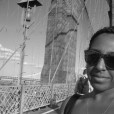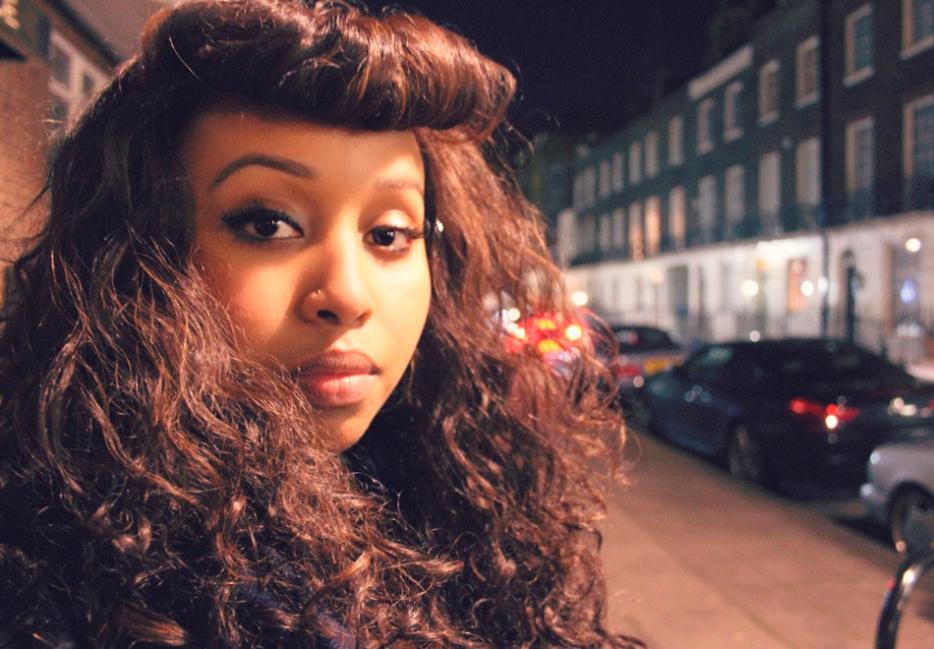Even before Warsan Shire’s distinctive Londonese takes hold, transforming her “-ing”s into “-ink”s, I feel like we could totally be friends. The 25-year-old British poet is wearing a sheer green top and knee-length black skirt, oversized triangle bamboo earrings, and a pair of black and neon orange Air Max 90s with waist-length rope twisted hair spilling over a camouflage jacket. It’s almost like an outfit I wore last week. She pulled it together while listening to Drake that morning, “It was ‘No New Friends’ or somefink emotional. He’s, like, the Dawson’s Creek of rap.” Best. Friends.
Shire is an emerging poetic force from Harlesden in Northwest London, and the winner of this year’s inaugural Brunel University African Poetry Prize. Her work, which includes 2011’s short volume Teaching My Mother How To Give Birth, as well as a seven-track album of poems, has brought the young writer a sizable global following comprised primarily, and most visibly, of young women of colour. There is something about what she does, and who she is, that has resonance with diasporic women, and amongst her more Tumblr-able poems are those about love, loneliness, faith and identity. But the Kenyan-born poet also writes about family, displacement, and her parents’ Somalia—a place to which she belongs, but has never visited. She is a benevolent, guileless narrator, locking her fingers softly and reassuringly around yours, while excavating the filth of personal and political traumas—eating disorders, sexual abuse, deportation, break-ups—and the joys of being difficultly named, indefinably woman, and brown.
Before a week of sold-out workshops and speaking engagements in August, Shire stopped by to chat about being a poet in 2013, writing, and the stories that inspire her work.
Someone recently told me they had a small outburst during your reading last year in Toronto. Your work clearly elicits certain emotions—what’s it like to be on the receiving end of that?
I’m really grateful to have the audience I have, because it seems like they have good taste in life in general! Maybe I’ll go look at their Twitter [accounts]—and I think I have amazing taste—and it’ll be like, “Ohmygod, the people who read my work are a bit like me.” They get the references, they’re from the same generation, they’re usually women of colour. Slowly you also start to see really random parts of the world, and people you thought wouldn’t have the same experiences as you. What you realize is, all human beings connect to this underlying theme of loss, or love, or loneliness.
You get to write and travel and read to people, but I want to say most people have a kind of musty idea about the day-to-day of a poet.
I travel a lot for work, but that’s not very common, especially with the part of world I’m from—there aren’t many British poets going around the world randomly reading stuff wherever. But I think it’s because the work is so universal: I’m talking about immigration and assimilation, and it’s personal and political at the same time. That’s why it works in Bosnia and it would work in India—it works anywhere, and probably works more elsewhere than it does in the actual country I’m in.
I know you’re the poetry editor for that super cool literary arts zine, Spook, and you also teach…
That’s wonderful, because then I get to choose which poems I can spend hours on the Internet looking for and giving opportunities to publish people who wouldn’t normally get published. That’s what Spook is about: Very experimental, and specifically for people of colour. But I teach poetry online, and I teach poetry face-to-face… That was weird, I just started thinking about Catfish. Have you guys been watching Catfish?
That’s that show based on the movie about the guy who finds out the girl he’s talking to online isn’t who she says she is?
If you have a kind of morbid fascination with what human isolation and loneliness can produce, you should watch Catfish! I think they should have some kind of therapist or counselor on hand, because it’s kind of devastating what happens. And rather than the person who is lied to, I always wonder about the other one who has felt so alone to do that.
This is what you do in your work, right? You dig into that other person…
I’m really excited: I’m working on a collection of short stories at the moment, inspired by everything strange. I recently met this person who told me she was making a documentary about all these strange, fantastical things that have happened to people. One of them was about a man living I think in Tokyo, in a small apartment. Every day, food would be eaten and things would be cleaned, or things would be dirtied, and he thought the place was haunted. Then he put up cameras, and what he actually found out was that the whole time he’d been living there a woman was living in his wall!
That’s terrifying.
That’s amazing. I hear that and I think, “This is the best thing I’ve ever head in my life!” That’s what inspires me.
What draws you to these “offbeat” or unexplored stories?
On one level I completely have a fascination with stories and getting to know people. On another, I completely recognize that there are members of society that come from specific communities that are completely dehumanized to the point where if they were to die, nobody would pay attention. So when you see a woman on a bus with a big hijab on and she’s got a little leather bag, most people don’t care about that, but what’s interesting for me is to give the backstory. Is she in love with her English schoolteacher at evening classes? What does she look like when she’s brushing her hair at night? What’s her favourite smell?
I also feel it’s my responsibility to tell the story of my family and friends.
Why is that?
Because I have this platform, and I don’t know where it’s come from, so I’m going to do what I can. Rather than just writing about ex-boyfriends… so boring, what is that? I think people are afraid to be responsible, because they take it in a very specific, very political, very obvious way. How patronizing would it be if I was like, “It’s my responsibility to speak for women of colour worldwide who have been oppressed”? But if I say, it’s my responsibility to share these peculiar personal stories, that’s so small and so possible, so why wouldn’t I?
Tell me a bit about your writing process.
I’m constantly writing in Notes in my phone, maybe 50 percent of the day. I write whenever I feel like writing, but I don’t force writing on myself because I enjoy it so much. I do need a ritual before writing, so I have to watch a film—the more perverse and depraved it is, the better. Like, Dogtooth. That film was so amazing. The cinematography was so light and there were all these terrible things happening...
How did you start writing?
I’ve always wanted to make films. I grew up in a really poor area, and we had a really bruk down youth club we used to go to in Wembley. One day they told us about a film workshop, and I thought I was going to be a big-time filmmaker, so I went. But they also had a poet whose name was Jacob Sam-La Rose, and he’s Guyanese—black, British, handsome. He looked cool, and I didn’t know poetry could look like that. I’d always written short stories, and he showed me poetry that wasn’t about rhyme, or rhythm. It was like a short story—or film—on the page. He says he saw something in me and started to mentor me and is now my current editor. We put together the manuscript for Teaching My Mother How To Give Birth, which I started when I was 18.
You also have a degree in creative writing. Has school been important?
For me it was important that I did a degree in creative writing, because I was then anchored to this. It wasn’t something I could back out of, and I was seriously interested in it and wanted to work on the craft as well.
When I was younger I used to say I didn’t care about form, and then I started to realize how important lineation is in the work. Line breaks, where they land, are so, so important to the work. And I didn’t realize before how unjust I was being by making poems all symmetrical or whatever. It’s actually a very English way of looking at poetry. It’s a strict and dry approach.
Something I’m playing around with now is specula poem, or mirror poem. It has a really filmic element, which is what I love about it. It works best if you write about something intense, or that you want to forgive or forget or a moment. So you write one stanza and then take the time to write it out backwards, then when you read it you go through the memory one way and it slows it down, so it’s like the whole memory in reverse. The stresses fall on different things and the whole tone changes. It’s like altering a memory—it’s amazing and cathartic what that can do. It’s really, really beautiful. That’s something form can do for you: Figure out something in the actual act of writing it [that you didn’t know before].
And that’s why I think the education of writing is important, so you can understand iambic pentameter and all that rubbish! [Laughs] The reason I have beef with iambic pentameter is because if you don’t speak in that accent, or that’s not your actual language, the meter doesn’t fit your work and so therefore they tell you you’re wrong and that’s bullshit.
What really brought you to poetry?
I think it’s very forgiving in the way it allows you to play with space. With regards to prose, I don’t think you can get away with or create what you can create with poetry. Poetry is like a portrait of a moment or person, and the poem is almost like looking at a photograph; it slaps you in the face and kisses you at the same time. Nothing else does that, with that brevity. Songs try to do it, but that’s three minutes. A poem, you read it and it kind of changes your life and you don’t know how it happened and you can never forget it. It’s like the best song lyric, the best line from a film—everything in the world that’s short and great put together.
I’ve heard that in Somali culture people used to share poetry through cassette tapes…
When my mum first moved I remember she’d get these cassettes in the post, which were letters read aloud. “How are you?” “Yes, I’m okay.” But there’d also be loads and loads of poems. You’d know the difference instantly because Somali poetry is alliteration. The language is so poetic anyway—you’d only know the difference between normal speech and poetry through the use of alliteration. My mum and dad had so many tapes, and they still do. In my family, if you sent a cassette to somebody it would be, like, praising them. So there are a lot from my grandmother to my mum praising her and her children and their children. It’s like a really, really, really, good, braggadocious rap—by my grandma. “Shots fired, my daughter’s the best!”—but in Somali. Poetry is so integral to Somali culture that it’s not high culture. My mum still writes little poems on the back of bus tickets. You don’t have to be literate, even.
What is it like being a British poet?
Poetry being published in the UK at the moment… less than one per cent is by black and Asian writers. So that’s the climate we’re working with. Nothing else needs to be said. That’s it.
Is that changing at all?
There are initiatives and programs, and amazing people doing amazing work. Bernadine Everisto is someone championing for diversity. Flipped Eye, my publishing house, is founded by an amazing writer and editor from Ghana called Nii Parkes. If they weren’t doing this work, there’d be no space. For me? Black, Muslim, female, daughter of refugees, and Somali? They’d be like, what? You’re not getting anything! [Laughs]
Let’s talk about the word “brave.” You’ve talked about hating this word being applied to you and your work.
What is that? What is bravery? Different people attach fear and taboo and stigma and shame to some things, and I don’t find much shameful or embarrassing. “Oh my god, you said ‘clitoris’? And there was two Somali men in the audience? You are so brave!” [Or] you’re sad and pathetic and you wrote about it, and we’ve all been there and not said it out loud, and so that’s brave.
What’s the hardest truth to write about?
I’m writing a lot about my father at the moment and I get a bit scared when I get to being honest about him. I’m still making him look like a fictional father, but you could make up shit or you can feel the fear and write through it. I haven’t found the place where I’m like, “I absolutely can’t go there.” Not yet, anyway. Sharon Olds is this poet who writes about family and marriage and friendship in a way that is graceful and so revealing. I would like to call it transparent rather than “brave.” I love transparency. I think transparency is really important.
Your work surrounding loneliness seems to resonate with a lot of people.
I think people who allow themselves to feel lonely and go into the centre of their loneliness and just sit there… maybe I’d use the word “brave” to describe them.






